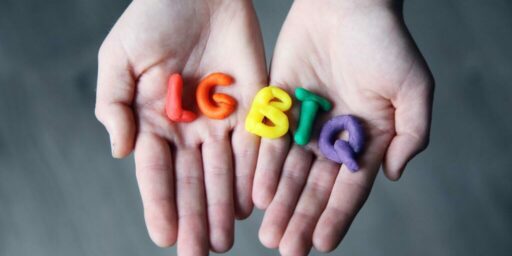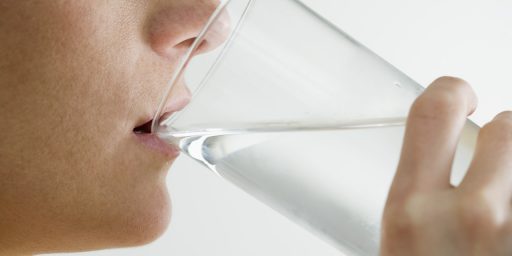The 8 Glasses of Water Myth
Dr. Stanley Goldfarb, a dean the University of Pennsylvania Medical School, explains why drinking large amounts of water each day provides zero benefits to one’s health.
Water, Water Everywhere . . . (The Weekly Standard)
How many times have you seen a young woman toting around a large plastic container filled with pure spring water–a commodity more precious than fuel at the pump–from the hills of Colorado, Pennsylvania, the Alps or some such high elevation? Is she really constantly thirsty? Is her need for water really three or four or more quarts per day? Does it make her skin more radiant? Is it just plain healthy? Will she become dehydrated unless she forces the water down at a steady pace? Should she follow the mayor of Philadelphia’s trademark advice and “Don’t forget to drink your water”? Correct answers: No, no, no, no, no, and sometimes.
The supposed health benefit of consuming large volumes of water has become one of those urban myths that even some physicians have come to endorse without real insight into the science underlying water intake and its effects on the body.
Several Nobel Prizes, the latest in 2004, have been awarded for discoveries that explain how humans perfectly regulate the total amount of water in the body. The marvelous system that regulates the body’s water content nearly perfectly prevents any excess, unless individuals consume enormous amounts (greater than a quart per hour for several hours) or they have a condition that impairs the normal robust capacity of their kidneys to eliminate over 20 quarts per day. As soon as a few ounces of extra water are consumed, a master hormone called anti-diuretic hormone (the name derives from the hormone’s capacity to stimulate the kidney to retain water) falls to undetectable levels and allows the kidney to excrete, in a matter of minutes, all of the surplus water ingested. This system–the hormone originates in the brain and acts upon a specific part of the kidney–exists in virtually all animals; It can lead to the retention of virtually all water ingested, if the body has a true water deficit, or the excretion of as much as 20 to 25 quarts of water per day, if intake of water is that excessive. It maintains perfect balance over the years so that total body water remains within a percent or so of the baseline for as long as one is healthy.
Our young woman toting around her bottle of water can only retain a few extra ounces in her body no matter how quickly she drinks it. Moreover, the amount she can retain is truly only a drop in the bucket. The svelte 5’9″ woman who weighs, say 125 lbs., has about 75 lbs. of water (about 35 quarts) in her body. The extra water retained in a few sips hardly increases the body’s content of water and even then, the excess is rapidly eliminated in the urine. Therefore there is no possibility that consumed water can make a sustained difference in anything but how often she needs to find a ladies room.
Indeed. The bottom line is that, except for people with kidney stones and a handful of other medical problems, there is simply no need to drink large amounts of water. And, for that matter, natural spring water is not particularly more beneficial than, say, iced tea.






I was under the impression that drinking the 8 glasses of water/day was more of an appetite suppressant.
It also keeps you from drinking soda or other not so healthy substitutes.
It also keeps you hydrated which drinking caffinated drinks like tea do not.
Drinking excess water does not keep you hydrated – your body is already regulating your hydration. I’ve read in countless places that the human body is sufficiently hydrated by the food and liquids we consume because they all contain water in some form. When we are truly dehydrated we are thirsty. When you’re thirsty is when you need to drink more water. Once the thirst is quenched you can stop drinking.
So, we read that eggs are no longer bad, greet tea does not prevent cancer, sunlight is good for you, we don’t need 8 glasses of water, coffee is in, coffee is out, etc. I suggest that we take all health news with a grain of salt – unless salt is bad for us.
herb –
all that supposedly contradictory health news isn’t contradictory at all – it’s just slightly more complex than the media – or the public – are able to comprehend.
Very mild sunlight exposure is good for you (those particularly susceptible to this health risk would be a dark-skinned person living through 6 months of winter in Boston). Heavy sunlight exposure is bad for you (this applies to pasty office workers that scald themselves on brief vacations and 90% of American youth that obsessively tan).
Coffee’s diuretic effect is conquered by the fact that it contains large amounts of water. the coffee bean has certain anti-oxidants and might help mildly stave off diabetes (probably due to the stimulatory metabolic effects of caffeine), but the ingestion of coffee also creates a pretty acidic metabolic environment and several cups per day will drain the vigor from your willie (among other things).
Eggs are less bad because –
1. Dietary cholesterol intake is less associated with your body’s high cholesterol level than poor dietary choices that have bad metabolic, hormonal effects – like simple carb ingestion.
2. They’re packed with vitamins and minerals and protein.
3. That being said, eating tons of egg yolks is still bad for you, as the animal fat and cholesterol causes inflammation in the body (something tied to all land-animal fats).
4. Green tea, is a great substitute for coffee, because it’s truly a MIRACLE plant. I have no idea what stories you’re reciting that cast aspersions on its cancer fighting ability, but it’s been tied to lower rates of various cancers (primarily ones in parts of the body where the tea will come into contact with potentially cancerous areas), as well as being cited in innumerable positive studies in applications as diverse as anti-inflammation to metabolic improvement to skin care. It’s a miracle substance. Drink up. Bathe in it.
5. Salt is indeed bad for you, in the quantities found in most prepared foods. Causes high blood pressure, water retention, fights with and overwhelms potassium for finite absorption ability.
None of this is contradictory; it’s just the apparently incommunicable complexity that goes over the media’s/public’s head. Which is why I get frustrated with simplistic outlets that tout breakthrough results that aren’t validates, as well as the outlets that sneer at them by providing an overly simplistic contradictory narrative.
A balanced diet, and moderation in all things. These concepts have been around since long before weight-loss fads and science hype.
Maybe there’s a reason for that.
I’ll always remember that scene from Sleeper that when Woody Allen woke up he was told that cigarettes weren’t in fact dangerous for you, and they were found to be medicinal.
Bill,
I think Herb was referring to the news from the FDA yesterday in which they (FDA) say Green Tea does not reduce risk of cancer.
Sweet tea hydrates you just fine, or else tens of thousands of Southerners would die every summer from dehydration.
No one has mentioned beer. This hormine must be released by beer since I can’t seem to retain any beer I drink more than 15 minutes or so.
If you lived in the Southwest, you’d tote a water bottle around with you, too: the air is very dry here, and you do get thirsty. For real.
Well, I just started drinking about 6 glasses a day and all I can say is that it definitly clears up the skin and pores. Your body adjusts to drinking that much after a while, so you don’t have to keep running to the bathroom every 20 minutes. It seems to be working for me.